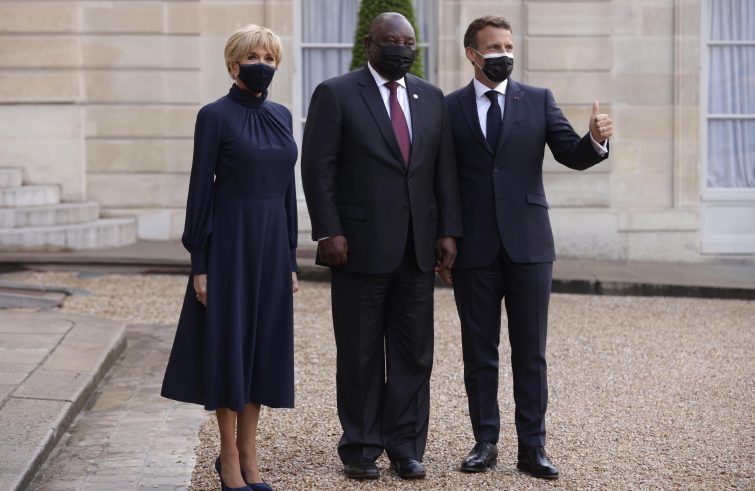
Paris hosted a ”resounding summit in France, yet inconspicuous in Africa. The people here weren’t even aware of it!”. France’s proposal to lift patents on Covid-19 vaccines might bring some hope (although it is only a proposal as yet), but “we are very sceptical about the IMF lending strategy, which creates bad debt for Africa.” This is the view of two African missionaries – in Zambia and Niger – who commented on the conclusions of the summit hosted by French President Emmanuel Macron in Paris (May 18-19) to discuss the financing of African economies hard hit by COVID-19.
 Africa remained far away. Macron’s New Deal for Africa remains unconvincing to some missionaries, who perceive it as a world vision “far removed from the daily life of our peripheries.” “Some funds may arrive, through financial conditionality mechanisms, but it will not deliver us from our prisons of poverty and desert”, said Father Mauro Armanino, Society of African Missions (SAM), contacted by “Popoli e Missione” in Niamay, Niger where he lives. “What I see is that Africa is being levelled down to the financial demands of the western world. The same approach applies to COVID-19: vaccines and patent rights have been discussed. But no mention was made of the relevance of treatment in Africa, and of the extent to which the pandemic was and is being stemmed by health care, albeit on a fragmented basis,” Fr Armanino continued.
Africa remained far away. Macron’s New Deal for Africa remains unconvincing to some missionaries, who perceive it as a world vision “far removed from the daily life of our peripheries.” “Some funds may arrive, through financial conditionality mechanisms, but it will not deliver us from our prisons of poverty and desert”, said Father Mauro Armanino, Society of African Missions (SAM), contacted by “Popoli e Missione” in Niamay, Niger where he lives. “What I see is that Africa is being levelled down to the financial demands of the western world. The same approach applies to COVID-19: vaccines and patent rights have been discussed. But no mention was made of the relevance of treatment in Africa, and of the extent to which the pandemic was and is being stemmed by health care, albeit on a fragmented basis,” Fr Armanino continued.
 Loans, not donations. The twenty African heads of State and top officials from European governments (along with several EU representatives) reached an agreement in Paris to mobilise additional EU funds through the IMF with a $100 billion low-interest loan package to tackle the COVID-19 crisis in Africa. However, “it should be remembered that these are loans, not donations”, said Father Antonio Guarino, a Comboni missionary from Zambia. The text of the agreement refers to a pledge, a commitment towards the IMF. Indeed, it states that there are ‘strings’ attached, conditionalities for obtaining the funds, and an obligation to repay, albeit at lower rates.”
Loans, not donations. The twenty African heads of State and top officials from European governments (along with several EU representatives) reached an agreement in Paris to mobilise additional EU funds through the IMF with a $100 billion low-interest loan package to tackle the COVID-19 crisis in Africa. However, “it should be remembered that these are loans, not donations”, said Father Antonio Guarino, a Comboni missionary from Zambia. The text of the agreement refers to a pledge, a commitment towards the IMF. Indeed, it states that there are ‘strings’ attached, conditionalities for obtaining the funds, and an obligation to repay, albeit at lower rates.”
Some positive assurances. France has also asked that the final barriers preventing Sudan from receiving new loans from the IMF be lifted, but there is uncertainty over repayment. “France is thus reaffirming its supremacy and control over the region south of the Sahara,” the missionaries remarked. Macron has scored some good results and pledges with regard to vaccine distribution (Paris is calling for 40% of the African population to be vaccinated by the end of 2021, via Covax), and on the proposal to lift patents on Covid-19 vaccines, thereby enabling Africa to develop its own vaccine.
Jihadist terrorism. “Macron’s support for lifting vaccine patents (along the lines of President Biden) is an important step, but it doesn’t mean that it will happen! The pharmaceutical lobby is trying to prevent this, as is happening in the US, and we must counter it now,” said Nicoletta Dentico, expert in international healthcare issues. During a mini-summit involving five Sahel countries (Niger, Mali, Burkina Faso, Benin and Chad), held on the sidelines of the main summit, discussions focused on desert borders and ways to stem jihadist terrorism, “but no mention was made of accepting migrants from Niger”, pointed out Father Armanino. “We see an evident discrepancy between our situation of extreme poverty and the discussions taking place in the diplomatic arena”, he added. “Here in Niger, President Mohamed Bazoum’s participation in these mundane, neo-colonial-style meetings, which consistently failed to benefit the people, is viewed with disapproval at a time when our people are facing problems of security and survival inside our sand borders.” Macron portrayed himself as “an Africa-rescuing Don Quixote or Robin Hood – the missionary concluded – but his is a markedly Euro-centric understanding of the relationship between the two continents, as it has always been. There is no alternative vision, and there are no prominent African leaders who are not subservient to colonial powers.”
*Popoli e Missione











